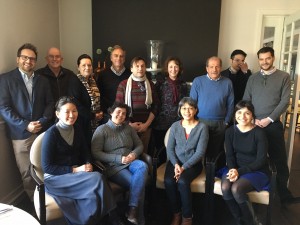Where should the focus be for capacity development, to improve agricultural innovation systems, as a means of ensuring higher and more sustainable productivity to fight food insecurity and rural poverty?

This is the main question in eight pilot countries as the Capacity Development for Agricultural Innovation, or CDAIS project, enters its second year.
From the 14th to 17th of March 2016, key people involved in the project including from each of the pilot countries, from AGRINATURA-EEIG member institutions, and representatives from FAO, met in the Dutch city of Leiden to share experiences and agree on how to ensure that planned interventions have the right impact, in the right places.
Inception workshops have already been held in Bangladesh, Laos, Guatemala, Honduras and Rwanda, where people came together to share their vision on capacities to innovate. The remaining countries, Angola, Burkina Faso and Ethiopia will hold inception workshops later in 2016.
The Leiden meeting was very important in identifying entry points and adding value. An inclusive needs assessment initiated a learning process within the innovation partnerships, guiding how and which capacities needed developing among organizations and individuals. National innovation facilitators to be trained will facilitate discussions to identify challenges and solutions within the innovation partnerships. Eventually, there will be a global exchange so each country can learn from each other and actions can be further scaled out.
The meeting proved to be an excellent opportunity to share and build on experiences, by those responsible for implementing the project in all eight countries. Scoping studies clarified who is doing what, where and how, in the area of agricultural innovation systems. These highlighted the rich and varying investments and drivers for change, and how capacities to innovate can be developed and strengthened between Africa, Asia and Latin America. Many of the challenges and opportunities are similar.
The project can already pride itself in having created awareness and agreement on the importance of a national platform in most countries. Here, different players involved in agricultural innovation can come together, exchange ideas, find solutions and form partnerships – that will help smallholder farmers improve food security.
